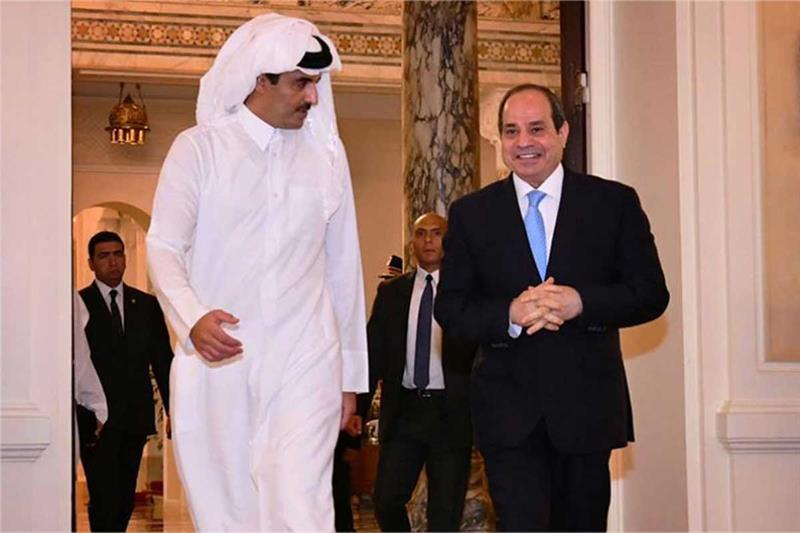
Egypt s President Abdel-Fattah El-Sisi with Emir of Qatar Sheikh Tamim bin Hamad Al-Thani before their meeting on Tuesday 9 August, 2022. Photo courtesy of Egyptian presidential spokesman Facebook page.
President El-Sisi’s visit to Doha on Tuesday reflects the level of excellence the relations between the two brotherly countries have reached, which culminated in Sheikh Tamim’s visit to Cairo in June, the official Qatari News Agency (QNA) quoted the Qatari Ambassador to Egypt Salem Mubarak Al Shafi as saying on Monday.
Tamim’s visit to Cairo was his first since the two countries resumed diplomatic ties following the Al-Ula Declaration, which ended a three-and-half-year diplomatic and economic boycott Egypt and three of the GCC members – Saudi Arabia, Bahrain and the UAE – had placed on Qatar.
President El-Sisi and Sheikh Tamim have met or talked on the phone on various occasions since signing Al-Ula agreement the latest of which was in July when they participated in the Jeddah Security and Development Summit along with leaders of the Gulf Cooperation Council countries, Iraq, Jordan and the United States.
The Egyptian and Qatari leaders also met on the sidelines of the Olympic Winter Games in Beijing in February.
Moreover, they also held a meeting last winter on the sidelines of the UN Conference of Parties on Climate Change Conference (COP26) in Glasgow few months after their meeting on the sidelines of the Baghdad Conference on Cooperation and Partnership in August.
Growing relations
Ambassador Al Shafi expressed his confidence that El-Sisi’s visit on Tuesday would establish "an unprecedented breakthrough" in the process of cooperation between them.
It comes within the framework of the “positive momentum” witnessed in the relations between Doha and Cairo, the Qatari ambassador added.
In the wake of Al-Ula declaration, Cairo and Doha have agreed to move beyond their disputes and work towards settling all their outstanding issues, forming an Egyptian-Qatari follow-up committee that has held seven rounds of negotiations over the past year, the last of which was in Doha last September.
The course of the follow-up committee has seen the signing of a number of bilateral deals to bolster ties between the two countries, which eventually formed the Egyptian-Qatari High Joint Committee – headed by the two foreign ministers – in March.
"The impurities that plagued the relations were removed through consensus on the statement of Al-Ula, the subsequent honest and sincere activation of the follow-up committee, and the positive results it reached," Egypt’s Foreign Minister Sameh Shoukry said during a presser with his Qatari counterpart in Cairo in March.
Qatar's Minister of Foreign Affairs and Deputy Prime Minister Mohamed bin Abdulrahman Al Thani said at the time that bilateral relations “are in constant development”, affirming his government's keenness for upgrading these relations.
“We see that the horizon of the relations between Qatar and Egypt is wide in boosting economic partnership and communication between the two countries on all levels,” the Qatari FM said, adding that the past period that was marred by tensions is over.
Following talks between Egypt’s Prime Minister Mostafa Madbouly and Abdulrahman Al Thani at the time, a Qatari package of $5 billion in investments and partnerships in Egypt was announced within "the framework of boosting economic cooperation between the two brotherly countries."
A week before Sheikh Tamim’s visit to Cairo in June, Egypt and Qatar signed an MoU in Doha on financial policy coordination to foster cooperation and coordinate financial visions, positions and policies at the bilateral and international levels.
According to Egypt’s Minister of Finance Mohamed Maait, the MoU, which aims to exchange expertise in the fields of taxation, customs, and financial policies, paves the way for reaching an agreement on preventing double taxation between the two sides with a view to stimulating joint investments.
This came on the sidelines of the Qatar Economic Forum when Egyptian Minister of Industry and Trade Nevine Gamea and her Qatari counterpart, Mohammed bin Hamad bin Qassim Al-Thani, agreed on reactivating the Egyptian-Qatari Business Council.
Gamea cited industrial partnerships between 4,500 Egyptian and Qatari companies as models for further cooperation, declaring a month later that she held a meeting with the Qatari Businessmen Association to explore the potential for boosting Qatari investments in the Egyptian market.
In July, Madbouly instructed the government to explore opportunities to boost investments and partnerships with Qatar.
Egypt is seeking to attract Arab and international investors to increase the private sector's participation in public investments, to 65 percent up from 30 percent currently, in the economy to take advantage of the new State Ownership Policy that delineates the state presence in certain sectors of the economy.
According to the policy, the government will exit 15 economic activities across seven sectors over the coming three years, including agriculture, water, sanitation, desalination, telecoms and IT, retail, food and beverages, as well as construction.
The government will also exit a number of activities across the leather, timber, engineering, jewellery, chemical, textile, printing, and pharmaceutical industries.
Short link: